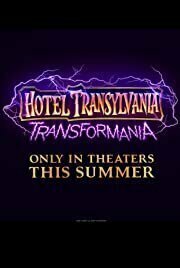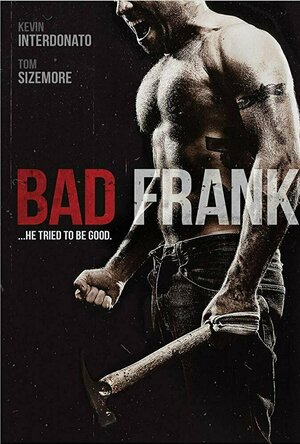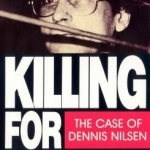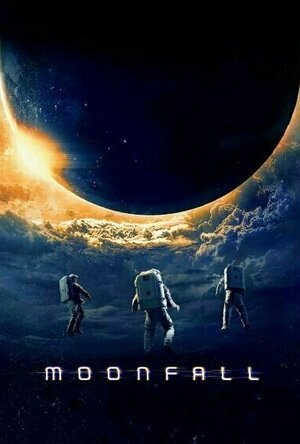Ridley Scott: Interviews
Laurence F. Knapp and Andrea F. Kulas
Book
Artisan, entrepreneur, and impresario, British filmmaker Ridley Scott accepts the profit motive as...

Over and Out by Rick Parfitt
Album
Featuring 10 brand new songs, including the title track that broke hearts anew when it was played at...
Chris Sawin (602 KP) rated Hotel Transylvania 4 (2021) in Movies
Jan 22, 2022
Despite some character designs (Bela in the second film, the Kraken in the third) and some tremendous end credit animations that are done in a very recognizable Tartakavsky style (think Dexter’s Lab or Powerpuff Girls), the films are mediocre at best and yet became a billion dollar franchise.
Hull and Abrell do a decent job matching their voices to the Drac and Frank characters. You may not have noticed the characters were voiced by someone else if you hadn’t known beforehand. However, the animation looks noticeably different. Maybe new directors Jennifer Kluska and Derek Drymon are to credit for that. Kluska was a storyboard artist on Hotel Transylvania 2 and 3 while Drymon was an executive producer of Adventure Time and was a storyboard artist on The Spongebob Squarepants Movie.
The film was also moved around several times thanks to COVID and the pandemic. Sony Pictures Releasing eventually nixed the film’s theatrical run and sold distribution rights to Amazon Studios. This is the only Hotel Transylvania film to be released directly to a streaming platform.
Considering that this is the fourth film, Transformania basically rewrites several characters to an extent that it ignores key details from other films. Johnny is now akin to Homer Simpson since he is dumber than he has ever been here. He had a stoner or frat boy with a heart of gold kind of vibe about him originally. He was very mellow by nature, but had seen a good chunk of the world and knew more than his behavior let on. He had stories even though he was young and he was likeable. Transformania turns him into a dumb and unfunny dork that is borderline offensive due to how annoying he is.
Dracula has lost whatever made him somewhat charming in the previous three films, as well. In Transformania, he’s looking to settle down with Ericka and retire from running the hotel. The intention is to give the hotel to Mavis and Johnny, but all of a sudden Dracula hates Johnny. The first three films are built around how close Johnny and Dracula become. Now Dracula just finds Johnny unbearable.
After establishing in the second film that Dennis is part vampire and has powers, that concept is totally erased in Transformania. Dracula hypnotizes Dennis in the beginning of the film and he remains that way for the bulk of the film without ever utilizing any sort of power or doing anything remotely relevant.
Instead of downright telling Johnny that he can’t stand him, Dracula lies and says that he can’t leave the hotel in the hands of a human; it can only be inherited by monsters. Johnny then discusses the matter with Abraham Van Helsing who uses his Monsterfication Ray to turn Johnny into a giant lizard-like monster. But the ray can also turn monsters into humans. Once Dracula discovers what Johnny has done, he attempts to turn Johnny back before Mavis finds out. The plan backfires and Dracula gets hit with the ray and is turned human. His friends Wayne, Griffin, Murray, and Frankenstein are also turned human. If a cure isn’t found, the results may be permanent.
The highlight of the film is the transformation sequences since they are noticeably inspired by the horror film genre; specifically An American Werewolf in London. The end credits sequence is also done in a similar style to the first three films, so that sequence is fairly entertaining as well.
Transformania otherwise feels like a downgrade all around and the bar wasn’t all the high to begin with. As expected, there is a dancing sequence that may or may not be something you look forward to. None of the gags come off as humorous as every character mostly seems to be aiming to be more obnoxious than the other. The “fun” lies within seeing the monster characters as humans. The most notable is Griffin who has been totally invisible until now.
Hotel Transylvania: Transformania had a lot of obstacles relating to its release and after viewing the film you can understand why. It’s a lukewarm sendoff that mostly feels like a lethargic attempt to recapture its former glory. It’s built around an entertaining concept that it doesn’t fully capitalize on. It ultimately obliterates character traits for trite gags and cliché punch lines.

CFI Tools General Aviation
Navigation and Utilities
App
CFI Tools General Aviation The General Aviation App is used to train for and prepare for General...
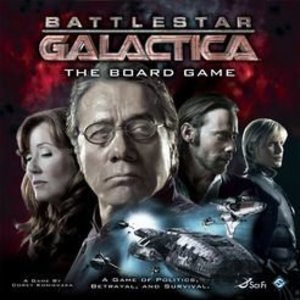
Battlestar Galactica: The Board Game
Tabletop Game
Battlestar Galactica: The Board Game is an exciting game of mistrust, intrigue, and the struggle for...
Hazel (1853 KP) rated My Sister's Keeper in Books
Dec 7, 2018
<i>My Sister’s Keeper </i>was the first Jodi Picoult novel I read. (I have since read all Picoult’s books to date) I was not expecting much when I first picked it up, especially as I was reading it for a medical ethics module at college. Yet this book rekindled my love of reading and suddenly, after only reading one story, I was asking for Jodi Picoult books for my birthday.
Many people may be familiar with the storyline, even if they have not read the book, as <i>My Sister’s Keeper</i> shot to fame when the film version hit the cinemas. Thirteen-year-old Anna Fitzgerald was Rhode Islands first genetically engineered baby, created with the purpose of providing her older sister Kate with the means to survive acute promyelocytic leukemia. However over the next few years Kate relapses resulting in Anna going under numerous procedures, such as bone marrow extraction, in order to save Kate’s life. Now things have got so bad that Kate will die unless Anna gives up one of her kidneys, yet unwilling to do this Anna hires a lawyer, Campbell Alexander, to sue her parents for the rights of her own body.
From reading a synopsis the reader can already see that <i>My Sister’s Keeper</i> is going to be an emotional story, but what was it that made me love the author so much?
The story was told from six points of view: Anna, Jesse (older brother), Sara (mother), Brian (father), Campbell and Julie (guardian ad litem). Notice that Kate was not one of the narrators, which leads us to speculate from the very start that Anna wins the case and Kate dies. Despite the six main characters there is no antagonist – unless you count cancer – and in all of them the reader can find something relatable.
In one of the chapters, Jesse pronounces that Kate is the martyr, Anna the peacekeeper and himself the lost cause. With Anna we can recognize the struggle to follow the decisions laid down for us by other people – a time when we have no choice of our own. Jesse represents the times when we have been ignored and forgotten because of bigger or more important events, thus resulting in attention seeking behaviour. Brian, the firefighter, the man who wants to save everyone, cannot put out the metaphorical fire that is his family. Sara, whose narrative starts in the past rather than present day, shows us how easy it is to get wrapped up in one problem (or daughter), ignoring everything (or everyone) else.
One thing that is great about all Picoult’s novels is that they are not focused on one storyline. Granted this book is focused on the trial and Kate’s illness, but the inclusion of Campbell and Julia’s voices provide an interesting subplot. Julia is not exactly thrilled to discover that she will be working alongside Campbell, a person she knew from school that she had a difficult past with. Since then Julia has found herself unlucky in love and blames Campbell for this. Campbell on the other hand has been having trouble of his own and now needs a service dog with him at all times. Yet he is self conscious about people knowing the true reason behind this and often comes up with creative lies to stop people from asking questions. “Maybe if God gives you a handicap, he makes sure you’ve got a few extra doses of humor to take the edge off.”
Another reason Picoult’s books are so great is that the reader learns something every time. <i>My Sister’s Keeper</i> is full of medical and legal jargon, which may go over some people’s heads, but it is also bursting with random bits of knowledge, for example the way a fire should be treated, facts about astronomy and many other interesting details that the characters use as metaphors to describe their experiences.
Without taking into account Picoult’s novels and writing style as a whole, <i>My Sister’s Keeper</i> is a story that will stay in people’s hearts and minds for a long time. It is never revealed who the narrator of the prologue was, but we immediately assume that it is Anna and that she wants Kate to die. By the end, we are still unsure who the character was but if it was Anna we see it in a completely different light. This is not a book about whether it is ethical for Anna to be Kate’s donor; it is not a story about cancer. Instead it is a message about the right for each person to have choices in regards to their lives.
A warning to potential readers: this book could break your heart, shock you or leave you in tears. <i>My Sister’s Keeper</i> is full of irony. Some of that makes up part of the story line, for instance Jesse’s experimentation with arson – fires that are then put out by his father. But the biggest sense of irony, the biggest shock is the ending (FYI this is the complete opposite to the film ending). After everything that has been achieved, devastating circumstances result in the same conclusion that it would have had Anna sat back and done nothing. Yet this does not make it a pointless story, despite Anna’s actions almost tearing the family apart, it also wakes them from the stupor that Kate’s illness has put them in and makes them realise how precious everything else in their life is too.
I highly recommend this book to everyone, and if you have not read a Jodi Picoult novel before I strongly suggest you begin with this one. It is suitable for adult and adolescent readers, especially those who like to think about hypothetical, moral questions. <i>My Sister’s Keeper</i> definitely gets you questioning your own choices and actions within your own life and may even make you view the world slightly differently.
Gareth von Kallenbach (980 KP) rated Cars 3 (2017) in Movies
Jul 11, 2019
McQueen is back, and at the top of his game…. Until he isn’t. Thrown off his winning streak by newcomer Jackson Storm, McQueen struggles with the realization that he may not have what it takes to win consistently anymore.
Hoping to train his way back to the top before the big racing season starts in Florida, McQueen heads to the brand-new Rust-Eze Racing training center built by his sponsors Dusty and Rusty. There, Lightening meets with the new owner of the Rust-Eze brand, big-wig business man Sterling (Nathan Fillion) and meets his new trainer, Cruz.
Cruz encourages McQueen to limber up and take it easy… go slow because he’s “old”. Lightening feels like Cruz is stifling him and slowing him down. Lightening feels he needs to “get his tires dirty” and go back to training the “old fashioned way”, so he heads out on the road, planning to train on the way to the big race in Florida.
As he treks across country with Cruz, he learns that there was more to his old mentor Doc Hudson than he realized, and that everyone has dreams, and that if you can help someone reach their dreams, sometimes it makes your own dreams attainable too.
The scenery / backgrounds were extremely lifelike in the 3-D version that we saw, and the movie had enough action to keep my 9 year old entranced the whole way through, even though the movie clocks a run-time of an hour and 45 minutes.
This third installment of the Cars series was SO MUCH better than the 2nd movie, and I would almost dare to say better than the first!
It has lessons of humility, acceptance, friendship, respect, hard work, all mixed together with loving what you do and mentoring others that love the same things you do; helping them overcome their fears and become stronger and more confident in themselves.
My 9-year-old son says it was a great movie, and he loved it so much that he wants to see it again “right now”. His favorite part was the Demolition Derby. He also says that Cars 3 is so good that he hopes that they make another sequel, starring the new characters, and following McQueen as he gets older.
365Flicks (235 KP) rated Bad Frank (2017) in Movies
Nov 20, 2019
I was instantly drawn to this Flick after stumbling upon its Twitter page and hey full disclosure I saw Tom Sizemore and Brian O’Halloran and thought ‘Okay, Im in’. Little did I know that after contacting the movies director I was about to watch a somewhat by the numbers movie that takes all of the numbers and turns them on there head with a great tightly written script and one hell of a powerhouse performance (not by either of the two men I named above by the way).
Bad Frank is about a man named ummmm Frank. Frank (played by Kevin Interdonato) is a seemingly normal guy living a seemingly normal existence. He seems to have it all, but you can tell right from the outset that the man has got some demons. We learn that he is on some serious medication to deal with his head aches from a life of regrets, He is estranged from both his mum and dad and struggling to keep his marriage together. Frank is pulled into an easy money job by his buddy Travis (Brandon Heitkamp) who is in deep to Donny Shakes (O’Halloran). What is promised to be a quick job brings Frank face to face with an old acquaintance he would rather forget. Things really go sideways on the job and in turn his life, when Franks wife Gina (Amanda Clayton) is kidnapped by face from the past Mickey Duro (Sizemore). I am gonna stop plot wise now because anymore and I am giving too much away.
Tony Germinario has pulled an absolute stormer out of the bag for his debut feature length movie, a fact that was completely lost on me upon viewing. For a budget of roughly 80k he has used all tricks at his disposal to make it look like a multi million dollar flick and Bad Frank looks all the more impressive for it. A lot of the time a the script to a movie like this can get lost in its own simplicity but Tony wrote a script that really didnt conform to what I was expecting and gave the lead a chance to deliver. So lets just talk about the lead, Kevin Interdonato brings an absolute realism and intensity to this role that sucks you right in and leaves you kinda second guessing yourself, anything could happen with this guy at any moment and that to me is scary. I went from feeling sorry for this guy to thinking well he deserved everything and ending up thinking ‘SHIT’.
Tom Sizemore is in fine form as Sizemore always is. An actor that I personally love and wish got more of the beefier roles but it was great to see him on screen and like I say, seeing his name splashed on the poster was one of the reasons I sought this one out. Then there is Brian O’Halloran doing his thing as he does (always liked this dude since his Clerks days nice to see him spreading his wings).
It is easy to see how Tony and his crew took Bad Frank to Film Fest International in London last week and was not only nominated for 5 awards but Tony himself won Best Director.
I am gonna recommend the shit out of this Flick, Bad Frank is not what you expect going in, there are some pretty cool curve-balls, it moves along at a quick enough pace and no spoilers but the final 10 minutes are a Tour-De-Force. Performances wise you are getting more bang for you buck in what the Director himself considers to be an “as Indie as it gets” movie (not that you can tell mind you).
Lyndsey Gollogly (2893 KP) rated Killing for Company: Case of Dennis Nilsen in Books
May 19, 2021
Book
Killing for Company: The Case of Dennis Nilsen
By Brian Masters
Once read a review will be written via Smashbomb and link posted in comments
__________________
Dennis Nilsen, who died in May 2018, admitted to killing at least 15 people before his arrest in 1983. This ground-breaking criminal study of his killings was written with Nilsen's full cooperation, resulting in a fascinating - and horrifying - portrait of the man who worshipped death.
In February 1983, residents of Muswell Hill had been plagued by blocked drains. When a plumber was called to investigate, he discovered a large blockage of biological material. To his horror, it appeared to be formed of human flesh and bones.
The next day, local resident Dennis Nilsen was arrested.
'Are we talking about one body or two?' a detective asked. Nilsen replied 'Fifteen or sixteen, since 1978. I'll tell you everything.'
Within days he had confessed to fifteen gruesome murders over a period of four years. His victims, mostly young gay men at a time when society cared little for them, had been overlooked. Killing for Company is a unique study of a murderer's mind, essential reading for true crime aficionados.
__________________
This is a seriously hard book to read and review! I grew up loving true crimes and British serial killers and a bit later American serial killers and although I knew this case as I’d read lots about it growing up I found this book hard going, not because it was poorly written but by the content and knowing Nilsen had a lot to say to Masters. I have read Masters book on Jeffery Dahmer and it was a decent retelling but to me it always seemed so far away! This however was in the UK and only 100+ miles down the motorway, he was in the army the same time as my dad and the fact he on paper seemed so bloody normal! He held a steady job and campaigned via the union for people under discrimination, he loved pets he didn’t have all the common markers as your typical serial killer! It’s only when he was on remand you start seeing how mentally ill he really was! It’s always hard to say you enjoy these types of books I tend to find them fascinating not enjoyable this one really hit home I cried and felt physically sick at several points. I want to know how it can suddenly change from being the person he was before the first murder to that monster ( the only word to describe him). Reading his reactions to how one victims parents would hopefully forgive him is chilling! Also the illustrations at the end of the book are just shocking! Worth a read and I would recommend but this left me asking so many questions!
Chris Sawin (602 KP) rated Moonfall (2022) in Movies
Feb 5, 2022
On January 12, 2011, during what is referred to as routine outer space maintenance (it’s a thing), an unidentified technological swarm caused significant damage to the astronaut’s shuttle; killing one of them and incapacitating the surviving two crew members. Brian Harper (Patrick Wilson) maneuvers the shuttle back to earth with no power while his navigator Jocinda Fowl (Halle Berry) is unconscious. Brian takes the fall as he’s labeled incompetent despite previously being an acclaimed hero and he loses his job with NASA.
Ten years later, the moon suddenly begins changing course as a hole 26-kilometers deep is discovered in the center of it. People on earth have three weeks before the moon begins falling to earth in city-sized pieces. While NASA scrambles to discover a solution, an orbital megastructure aficionado and conspiracy blogger named K.C. Houseman (John Bradley) knew about the moon’s shift in course before NASA and may end up being the savior of mankind.
The opening scene of Moonfall lets its audience know that they’re in for an excruciating two hours. Patrick Wilson and Halle Berry argue over the lyrics to Toto’s “Africa” as Wilson musically screeches the 80s rock ballad to annoying results. The film does a few things right like earth’s gravity being a complete dumpster fire and the ocean literally being at foot of everyone’s door like Bo Burnham talked about in Inside. But then introduces the aspect of orbital megastructure in an attempt to not adhere to believable physics while lethargically committing to it.
Flooding, earthquakes, and birds falling to the ground due to gravity alterations are the culmination of the insanity in Moonfall. The moon coming closer to earth also apparently means humans can lift trees above their head and jump over gaps left by fallen bridges with little effort. There’s an awkward car chase between some redneck looters and the main characters of the film.
It’s awkward due to the fact that it’s really funky visual effects (literally everything taking place on the road and in the background) with green screen (the actors driving the cars), but it’s difficult to distinguish what’s what in a bad way. The CGI and special effects in the film are that peculiar blend of not necessarily being bad, but are just off-putting enough to look weird in some capacity. It’s a high speed chase involving a gravity wave, which is mostly just cars and debris floating in the air as the sky turns red. Coincidentally enough, the disaster effects are the best part of the film because they do what they’re supposed to do without overstaying their welcome.
The dialogue in the film is atrocious and Halle Berry is a filter for most of the bad lines. Some of her gems include, “I don’t work for you, I work for the American people and I don’t like keeping them in the dark,” “I am…(the longest pause ever between one word and another)…thinking about our son,” and something overwhelmingly corny about earth’s hourglass and our time running out. Donald Sutherland can barely stomach a brief cameo appearance shared with Berry’s character before excusing himself to the loaded gun he left back in his room (yes, this actually happens).
The evacuation route in Moonfall seems to involve fleeing to Colorado. What is in Colorado and why that’s important is never really explained other than because everyone else is there. Jocinda Fowl becomes the lead director of NASA during the film and her ex-husband (played by Eme Ikwuakor) works for the military. Ikwuakor does nothing but squint like French Stewart the entire time. NASA wants to survey the activity of what’s transpiring on the moon, fly inside of its new fancy made hole, and come up with a plan to save earth in the process. The military just wants to blow up the moon with nukes; screw the consequences, this is America!
With Moonfall, Roland Emmerich has essentially made an even dumber version of Michael Bay’s Armageddon. There’s not a lot to enjoy here apart from KC Houseman’s house cat being named Fuzz Aldrin. With its idiotic premise, hammy dialogue involving some of the most exaggerated emotional speeches ever, stiff acting, unfunny humor, and purposely distorted CGI, Moonfall features an overwhelming amount of frenetic nonsense and has no excuse to be as boring as it is.

